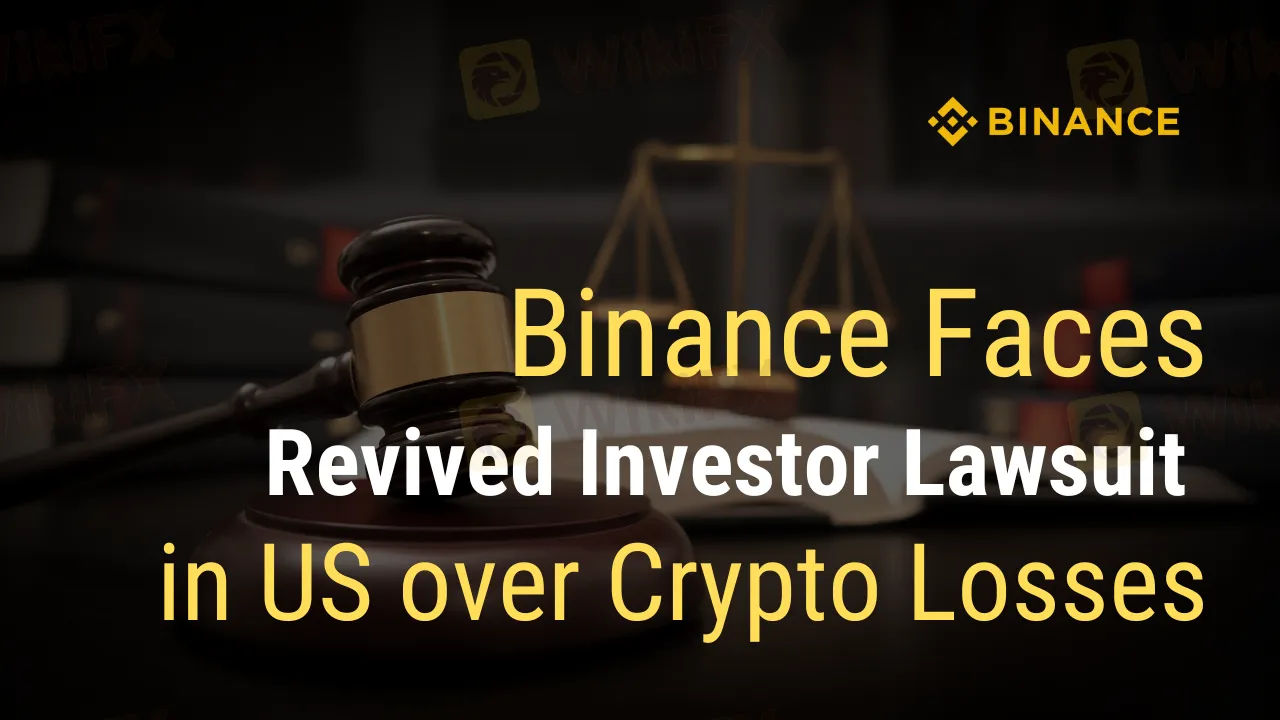简体中文
繁體中文
English
Pусский
日本語
ภาษาไทย
Tiếng Việt
Bahasa Indonesia
Español
हिन्दी
Filippiiniläinen
Français
Deutsch
Português
Türkçe
한국어
العربية
Binance Faces Revived Investor Lawsuit in US over Crypto Losses
Abstract:Investors sue Binance, alleging violations of US securities laws due to token losses. The court revives the case, ruling purchases made in the US trigger laws.

An American investor is suing against Binance, the world's biggest exchange, for bitcoin losses. Investors sued Binance, alleging that the company had violated U.S. securities laws by issuing unregistered tokens that had seen a sharp decrease in value. A ruling by a federal appeals court on Friday brought the case back.
Investors in the proposed class action won, 3-0, at the Manhattan 2nd U.S. Circuit Court of Appeals. Since investors' purchases of tokens became irreversible in the U.S. upon payment, the court determined that their claims that domestic securities rules applied were plausible. To demonstrate the relevance of U.S. securities laws, Circuit Judge Alison Nathan emphasized Binance's use of local Amazon computer servers to run its platform.
Additionally, the appeals court permitted claims for investors regarding purchases made within a year of filing the complaint. Judge Andrew Carter of the United States District Court returned the case after this judgment reversed his March 2022 ruling.

Investors who purchased seven tokens via Binance beginning in 2017 - ELF, EOS, FUN, ICX, OMG, QSP, and TR and saw their values plummet significantly after that are the subject of the complaint. Aiming to get their money back, investors said Binance neglected to alert them to the significant dangers associated with the tokens.
Pretending that its exchange is situated abroad, Binance claimed that U.S. securities legislation does not apply to the operation. The 2010 Morrison v. National Australia Bank ruling by the U.S. Supreme Court was mentioned, which restricted the reach of national securities laws.
After being contacted for comment after the court's decision, the lawyers for Binance did not immediately reply.
Plaintiff's counsel, Jordan Goldstein, expressed his happiness that the court saw his client's accusations as believable. Attorney Jordan Goldstein for the plaintiffs expressed satisfaction that the judge accepted his client's allegations. Binance, due to its violation of federal sanctions and money laundering, acknowledged culpability and incurred a $4.3 billion fine. These sanctions have not settled the lawsuit.
Changpeng Zhao tendered his resignation as the Chief Executive Officer of Binance after his admission of financial impropriety. on April 30th, convicted.
Currently, the Southern District of New York is presided over the Lee et al. v. Binance et al. case before the Second United States Circuit Court of Appeals.

Disclaimer:
The views in this article only represent the author's personal views, and do not constitute investment advice on this platform. This platform does not guarantee the accuracy, completeness and timeliness of the information in the article, and will not be liable for any loss caused by the use of or reliance on the information in the article.
Read more

Why More People Are Trading Online Today?
Discover why online trading is booming with tech, AI, and a push for financial freedom. From stocks to crypto, it’s a thrilling hustle for all.

SEC Ends Crypto.com Probe, No Action Taken by Regulator
The SEC has closed its investigation into Crypto.com with no action taken. Crypto.com celebrates regulatory clarity and renewed momentum for the crypto industry.

Interactive Brokers Expands Crypto Trading with Solana, XRP, Cardano, and Dogecoin
Interactive Brokers adds Solana, XRP, Cardano, and Dogecoin to its platform, enabling U.S. and U.K. clients to trade crypto 24/7 with low fees.

Fidelity Investments Explores Stablecoin Innovation in Digital Assets Sector
Fidelity Investments tests a stablecoin, joining major financial firms in the booming crypto sector. Discover how this impacts digital payments and blockchain adoption.
WikiFX Broker
Latest News
Enlighten Securities Penalized $5 Million as SFC Uncovers Risk Control Failures
Why Are Financial Firms Adopting Stablecoins to Enhance Services and Stability?
Experienced Forex Traders Usually Do This Before Making a Lot of Money
Octa vs XM:Face-Off: A Detailed Comparison
When High Returns Go Wrong: How a Finance Manager Lost RM364,000
Bridging Trust, Exploring Best—WikiEXPO Hong Kong 2025 Wraps Up Spectacularly
Fidelity Investments Explores Stablecoin Innovation in Digital Assets Sector
Interactive Brokers Expands Crypto Trading with Solana, XRP, Cardano, and Dogecoin
SEC Ends Crypto.com Probe, No Action Taken by Regulator
Why More People Are Trading Online Today?
Currency Calculator







